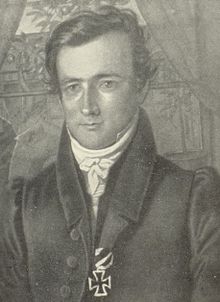Adolf von Thadden-Trieglaff
Adolf von Thadden-Trieglaff (also Triglaw ) (* January 1796 in Berlin ; † November 25, 1882 ) was a Prussian landowner, conservative politician and the focal point of the pietistic- Protestant revival movement in Pomerania . He was the father of Marie von Thadden-Trieglaff , who had a great influence on Bismarck.
Life
He came from the old Pomeranian noble family von Thadden . His parents were Colonel Ernst Dietrich von Thadden (* 1745, † September 16, 1799) and Caroline Wilhelmine Henriette von Wartensleben (* August 8, 1772, † July 19, 1849). His maternal grandfather was Lieutenant General Leopold Alexander von Wartensleben .
He was educated in the cadet corps in Berlin. As a cadet he took part in the Wars of Liberation and was wounded near Bautzen . Among other things, he took part in the crossing over the Elbe and the Battle of Waterloo .
Thadden had already come into contact with the revival movement during the war . He found connection to the German Table Society . During a trip to Munich in 1816/17 with other like-minded people, he met various Catholic revival preachers. This strengthened his attitude. After the end of the war, Thadden left the army and became a landlord on the Trieglaff estate ( district of Greifenberg in Pomerania ) acquired by his father-in-law .
After his marriage to Henriette geb. von Oertzen (1801-1846) Thadden was one of the main characters of the Pomeranian revival movement. This highlighted the importance of the Bible and individual piety , and emphasized the importance of sin and grace. In this circle there were numerous personalities of Prussian politics who later came to prominence, such as the young Otto von Bismarck (1815–1896) or Ernst Ludwig von Gerlach (1795–1877), with whom Thadden would be lifelong friends.
Politically he and the group were close to Friedrich Wilhelm IV. Theologically, the group opposed a. a. Exit Friedrich Schleiermacher . Thadden was opposed to the Prussian Union , resigned from the Evangelical Church in Prussia and joined the Evangelical Lutheran Church in Prussia . He became one of their leading representatives.
In the years 1847 and 1848 he was active in parliament in Prussia. Besides Bismarck, he was one of the extremely conservative MPs. In the United State Parliament he spoke out against the planned election law . During the revolution of 1848 he tried to contribute to the collection of the Conservatives and published his views in newspapers and in various prints with sometimes eccentric formulations. Although he wanted to agree to a press law, he also demanded the erection of a gallows for those who sinned through the press.
Like many highly conservatives, he followed Bismarck's development into a real politician with rejection. When Bismarck called for a boycott of the conservative Kreuzzeitung newspaper in 1876 because of attacks on himself, numerous conservatives signed an appeal in which they publicly distanced themselves from Bismarck and his politics. As the last of the declarants , Thadden signed the appeal "with deep pain".
See also
literature
- Berner: Thadden-Trieglaff: Adolf v. Th.-T. (Triglaw) . In: Allgemeine Deutsche Biographie (ADB). Volume 37, Duncker & Humblot, Leipzig 1894, p. 634 f.
- Hermann Petrich : Adolf and Henriette von Thadden and their Trieglaffer Circle: Images from the awakening movement in Pomerania. Stettin: Fischer & Schmidt 1931 (research on the church history of Pomerania 2)
- Burkard Krug: Thadden-Trieglaff, Adolf von. In: Biographisch-Bibliographisches Kirchenlexikon (BBKL). Volume 14, Bautz, Herzberg 1998, ISBN 3-88309-073-5 , Sp. 1541-1542.
- Wolfgang Marzahn : The nobleman among the brothers . 1st edition. Verlag der St. Johannis-Druckerei C. Schweickhardt, Lahr-Dinglingen 1957. 2nd changed and expanded edition as volume 32 of the series Our homeland . Pommerscher Buchversand, Hamburg 1978.
- Rudolf von Thadden : Trieglaff. A Pomeranian environment between church and politics. 1807–1948 , Göttingen 2010, ISBN 978-3-8353-0760-5 .
Individual evidence
- ^ Julius von Wartensleben, Nachrichten von dem Geschechte der Grafen von Wartensleben , Volume II, p. 231, digitized version
- ↑ Lothar Gall: Bismarck - The white revolutionary. Frankfurt, 1980. p. 546
| personal data | |
|---|---|
| SURNAME | Thadden-Trieglaff, Adolf von |
| BRIEF DESCRIPTION | Pietist and politician (conservative) |
| DATE OF BIRTH | January 1796 |
| PLACE OF BIRTH | Berlin |
| DATE OF DEATH | November 25, 1882 |


